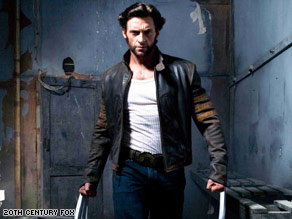'Night at the Museum: Battle of the Smithsonian'

Doane Gregory / 20th Century Fox
Ben Stiller returns as museum guard Larry Daly in the new film, "Night at the Museum: Battle of the Smithsonian."
Ben Stiller is back as Larry Daley, though he's ditched the night guard gig at the Museum of Natural History in New York City despite the very cool gold tablet that hangs in the Egyptian room and actually brings everything to life at night. Now he's become an infomercial king with a fortune made hawking gadgets like glow-in-the-dark flashlights with his good pal George Foreman. Since nothing even remotely interesting or funny happens outside of the museum, thankfully we don't stay there long.
As director Shawn Levy pretty much worked through all of the Natural History Museum's dioramas, bony T. rexes, stuffed mammoths and most of Teddy Roosevelt's ( Robin Williams) sage advice in the first film, he has taken the show on the road. Besides, museum traffic is down, hologram-creating 3-D technology is taking over, and so the gang is being packed up and shipped to the Smithsonian for storage, which means that Owen Wilson, Steve Coogan and most of the stars of the first film are back.
Whether or not she wins Larry's heart, who cares, she had the rest of us at "Hello."
She's been brought to life for the night by the gold tablet, which the Natural History guys sneaked into their packing crates. But there's a downside to that, as history is filled with at least as many villains as heroes and this particular wing of the Smithsonian has more than its share.
The main bad man is Kahmunrah, a very funny Hank Azaria playing the fictional pharaoh very imperious and very fey. For Kahmunrah, it's a sibling rivalry issue; the gold tablet was at the NYC museum with his brother, but it fits in one of the relics from Kahmunrah's tomb and, besides, mom meant him to have it. Now if he can just unlock its mystery, he'll be able to open a door to the past, call up his evil legions and rule the world.
As luck would have it, some of the most notorious villains ever are housed under the same roof, including Ivan the Terrible ( Christopher Guest), Napoleon (Alain Chabat) and Al Capone (Jon Bernthal), and Kahmunrah recruits them all. Unfortunately they don't do all that much for him, and they do even less for the movie.
Though the context throughout the film is meant to be a clever take on what history teaches us, as the story unfolds and the battles rage, what we get instead is too much pointless slapstick epitomized when the capuchin monkey and Stiller face off, slapping each other silly. There's a new conceit that's been added, with the pictures hanging in the galleries coming to life too. It works quite well when a classic photo provides a clever escape for Larry and Amelia, who hide in the Times Square crowd on VJ Day, while the soldier kisses the nurse, and not as well when Amelia dances with the Degas ballerinas.
In case you were expecting one, there is no real moral to this story from screenwriters Robert Ben Garant and Thomas Lennon, the team who also wrote the first film based on Milan Trenc's children's book of the same name. Still, there is some fun to be had in watching big, clumsy things run noisily through a museum.
Maybe next time the gang could head to Punxsutawney, Pa. You know, little furry Phil, Bill Murray, "Groundhog Day" meets "Night of the Living Dead." In a museum. Think of the possibilities
 Red Cliff marks John Woo’s return to his Asian filmmaking roots following his stint in Hollywood, and with a budget of US$80 million, many have touted this as a blockbuster epic that Asians would be proud of, especially one coming from Woo. A dream project of his, Red Cliff undoubtedly garnered plenty of buzz since Day One, and its casting has been nothing short of a musical chairs game, with actors revolving in and out of the door, especially when Chow Yun-Fat and Tony Leung Chiu-Wai had announced their departure from the project, only for the latter to return to fill in Chow’s shoes, and Takeshi Kaneshiro to take over the void left by Leung.
Red Cliff marks John Woo’s return to his Asian filmmaking roots following his stint in Hollywood, and with a budget of US$80 million, many have touted this as a blockbuster epic that Asians would be proud of, especially one coming from Woo. A dream project of his, Red Cliff undoubtedly garnered plenty of buzz since Day One, and its casting has been nothing short of a musical chairs game, with actors revolving in and out of the door, especially when Chow Yun-Fat and Tony Leung Chiu-Wai had announced their departure from the project, only for the latter to return to fill in Chow’s shoes, and Takeshi Kaneshiro to take over the void left by Leung.







